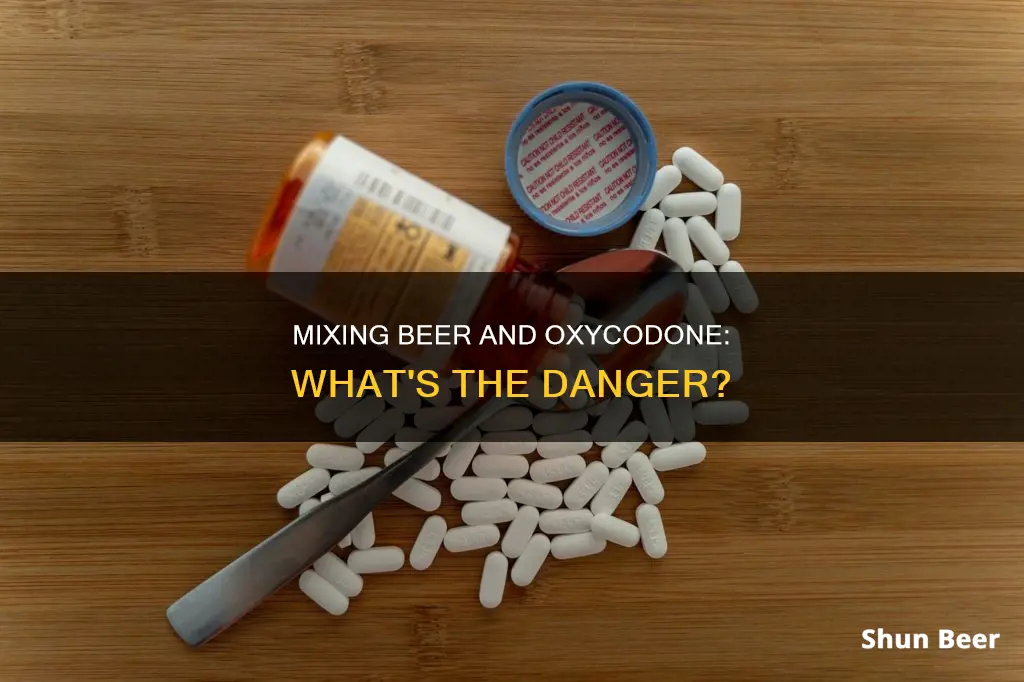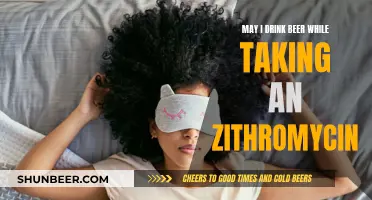
Oxycodone is a highly addictive opioid, typically prescribed to relieve moderate to severe pain. It is dangerous to mix any opioids with alcohol, and the combination of oxycodone and alcohol can be lethal. Both substances are central nervous system depressants, slowing down a person's breathing and heart rate. Mixing the two can lead to respiratory depression, a condition characterised by minimal or no breathing, which can quickly cause brain damage and death.
| Characteristics | Values |
|---|---|
| Safety | Never safe to mix |
| Effect | Dangerous, unpredictable, potentially deadly |
| Reasons for Mixing | Modify or enhance the effects of a single substance, compensate for weakened effects, prevent withdrawal symptoms, alleviate stress, replace preferred drug of choice |
| Treatment | Polysubstance use treatment, detoxification, behavioural therapy, medication, support groups |
What You'll Learn

Oxycodone and alcohol are central nervous system depressants
When taken separately, oxycodone and alcohol can cause significant side effects. However, when combined, the effects can be intensified and even life-threatening. One of the primary concerns when mixing the two substances is the impact on the respiratory system. Both oxycodone and alcohol can slow down breathing, leading to a decreased oxygen supply to vital organs. This can result in breathing difficulties, shallow breathing, or even respiratory failure.
Another dangerous effect of mixing oxycodone and alcohol is the impact on the cardiovascular system. The combination can cause a decrease in heart rate, leading to a dangerously slow heartbeat and potentially cardiac arrest. Furthermore, mixing the two substances can result in extreme drowsiness and sedation, impairing cognitive function, coordination, and reaction time.
The combination of oxycodone and alcohol also significantly increases the risk of overdosing. Both substances enhance each other's effects, making it easier to reach dangerous levels of intoxication. This is particularly concerning as an overdose can be fatal. In addition, long-term consumption of both substances can have severe consequences on the liver, as they are metabolized by the liver, and excessive consumption can lead to liver damage or even liver failure.
It is crucial to understand that the dangers of combining oxycodone and alcohol outweigh any perceived benefits. If you are taking oxycodone, it is essential to consult with your healthcare provider about the potential risks and alternative options. The unpredictable and potentially fatal effects on the central nervous system, respiratory system, cardiovascular system, and cognitive function make it an extremely dangerous practice.
Beer Drinking in Central Park: What's Allowed?
You may want to see also

Mixing the two can cause respiratory depression
Oxycodone is a powerful opioid pain medication often prescribed for moderate to severe pain. It is highly addictive and can cause drowsiness and slowed breathing. Alcohol is also a central nervous system depressant that slows down an individual's heart rate and breathing. Mixing the two can be extremely dangerous and even fatal.
Oxycodone and alcohol are both central nervous system depressants. When taken together, they can have a synergistic effect, meaning that the impact of both drugs together is more significant than when they are used separately. This can lead to slowed or even stopped breathing, a condition known as respiratory depression. Respiratory depression can quickly cause brain damage and death if left untreated. It is a form of suffocation, and drinking even a moderate amount of alcohol along with taking just one oxycodone pill can put someone at risk.
The combination of oxycodone and alcohol also endangers the heart. Since they are depressants, both substances slow down a person's heart rate. Mixing them may shock the cardiovascular system, leading to a heart attack or stroke.
The elderly are particularly vulnerable to the dangerous effects of mixing oxycodone and alcohol. According to a study in the journal Anesthesiology, combining alcohol with oxycodone led to a significant increase in the number of episodes of temporary breathing cessation in elderly participants.
In addition to the risk of respiratory depression and cardiovascular problems, mixing oxycodone and alcohol can also result in other adverse health outcomes, such as impaired motor control, risky sexual behavior, and anoxic brain injury.
Due to the severe risks associated with mixing oxycodone and alcohol, it is crucial to avoid consuming alcohol while taking oxycodone. If you or someone you know is struggling with addiction to either or both substances, seek professional help immediately.
Drinking Beer at Foroya Bjor: What's the Deal?
You may want to see also

The combination can lead to heart attack or stroke
Oxycodone and alcohol are both central nervous system depressants. When combined, they can have a synergistic effect, meaning that the impact of both drugs together is more potent than when they are used separately. This combination can lead to respiratory depression, or slowed breathing, which can result in suffocation and even death. The elderly are particularly vulnerable to this effect.
In addition, since both substances are depressants, they slow down a person's heart rate. Mixing alcohol and oxycodone may, therefore, shock the cardiovascular system and cause a heart attack or a stroke. This is especially true if an overdose occurs, in which case the combination can lead to heart failure and death.
The dangers of mixing oxycodone and alcohol are well-established. According to the CDC, alcohol was involved in 22% of deaths and 18% of emergency department visits related to prescription opioid misuse in 2010. Given these risks, anyone who has a prescription for an oxycodone-based medication should avoid alcohol completely.
Beer Drinking in Public: North Carolina's Law
You may want to see also

Oxycodone is highly addictive
Oxycodone interacts with opioid receptors in the brain and blocks the transmission of pain signals in the nervous system. It also causes sedation and euphoria by releasing a surge of dopamine, a neurotransmitter that reinforces behaviour. This effect is so powerful that people sometimes develop an addiction to oxycodone after a single use. Oxycodone is often obtained and misused by taking too much OxyContin or Percocet or by purchasing illegal pills from drug traffickers. On the street, oxycodone pills are known as "oxys," "percs," or "512s."
The addictive nature of oxycodone is further exacerbated by its respiratory-suppressing effects. When an individual overdoses on oxycodone, they may suffer from lethal respiratory failure. The elderly are particularly vulnerable to fatal oxycodone overdose. Additionally, mixing oxycodone with other substances, such as alcohol, can increase the risk of adverse health outcomes, including impaired motor control, risky sexual behaviour, anoxic brain injury, and other organ damage.
The combination of oxycodone and alcohol is highly dangerous as both are central nervous system depressants. Alcohol, like opioids, slows down a person's breathing, and when combined, the respiratory system may be overwhelmed, leading to respiratory depression or even failure. This form of suffocation can quickly cause brain damage and death. Furthermore, as depressants, alcohol and oxycodone slow down heart rate, and mixing the two may shock the cardiovascular system, resulting in a heart attack or stroke.
The accessibility of both alcohol and prescription oxycodone-based medications makes it easy for individuals with no history of substance abuse to unknowingly put themselves at risk. It is crucial for individuals taking prescription oxycodone to avoid alcohol completely to prevent potentially fatal consequences.
Beer and Phentermine: Is It Safe to Mix?
You may want to see also

Mixing oxycodone and alcohol can be fatal
Oxycodone is a highly addictive opioid, used to treat moderate to severe pain. It is a dangerous drug, classified as a Schedule II controlled substance, meaning it has medical value but also poses a high risk for abuse and addiction.
Alcohol is a central nervous system depressant, slowing down a person's breathing and heart rate. Oxycodone also has this depressant effect, and when the two are combined, the results can be fatal. The mixture can cause respiratory depression, a condition where breathing slows or stops completely, leading to suffocation and, if left untreated, brain damage and death. The combination also puts the heart at risk of attack or stroke.
The elderly are particularly vulnerable to the effects of this combination, and even moderate amounts of alcohol with a single oxycodone pill can be enough to trigger respiratory depression.
Mixing oxycodone and alcohol is, therefore, extremely dangerous and can be fatal. The two should never be taken together.
Detox and Drinking: Is Having a Beer Safe?
You may want to see also
Frequently asked questions
No, you should never mix alcohol and oxycodone. Both substances are central nervous system depressants, which slow down breathing and heart rate. Mixing the two can lead to respiratory depression, a condition characterised by minimal or no breathing, and can cause an overdose, brain damage, or even death.
Mixing oxycodone and alcohol can have serious and dangerous consequences, including slowed or stopped breathing and heart function, and even death. The combination of the two substances can also lead to irreversible brain damage and major organ damage, resulting in physical and cognitive disabilities.
If you or someone you know is mixing oxycodone and alcohol, it is important to seek professional help as soon as possible. Treatment for polysubstance use is available and often includes detoxification, psychological treatment, pharmacological treatment, and monitoring.







